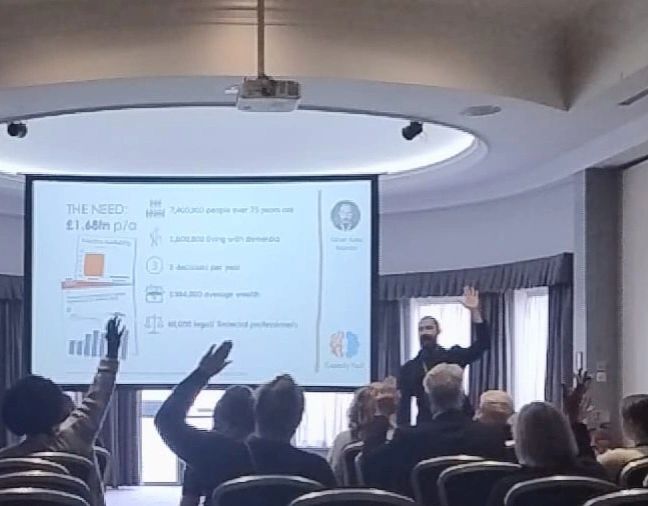News: Capacity Vault Founder addresses Society of Will Writers’ Annual Conference
Protecting Wishes in an Aging World: Insights from the Society of Will Writers’ Conference
On October 8th, Oliver Asha, founder of Capacity Vault, addressed the Society of Will Writers’ annual conference focusing on the growing importance of understanding testamentary capacity in the context of an aging population. Oliver discussed best practice when working with older clients and offered a case update for SWW Members. This post summarizes the key takeaways from Oliver’s presentation.

The Aging Population and Its Implications for Estate Planning
Oliver began by highlighting the undeniable demographic shift toward an older population. With more people living longer, the incidence of age-related cognitive decline, including dementia, will double this decade. This trend has profound implications for the estate planning sector. Solicitors and will writers must be equipped to handle the complex challenges of assessing testamentary capacity and ensuring that the wishes of older clients, who may be more vulnerable to influence or exploitation, are genuinely upheld.
Best Practices for Working with Older Clients
Oliver stressed the need for estate planning professionals to adopt best practices when working with older clients. He emphasized the importance of:
- Patience and Sensitivity: Recognizing that older clients may require more time and support to articulate their wishes clearly.
- Clear Communication: Avoiding legal jargon and ensuring that clients understand the implications of their decisions in plain language.
- Capacity Awareness: Being vigilant for signs of cognitive impairment and being prepared to thoroughly assess capacity whenever doubts arise.
- The ‘Golden Rule’: Oliver repeatedly addressed the ‘Golden Rule’ and the potential practical issues a practitioner may encounter. The Golden Rule encourages practitioners to consider obtaining a medical opinion on capacity when a client is elderly or has been unwell. While not mandatory, this practice provides an extra layer of protection for both the client and the legal advisor.

Recent Case Law: Lessons Learned
Oliver provided an overview of three recent cases involving testamentary capacity disputes that offered valuable insights for estate planning professionals:
- Leonard v Leonard & Ors EWHC 321 (Ch): This case centered around a challenge to the 2015 Will of Dr. Leonard (“Jack”) brought by his children from his first marriage. The court found that Jack lacked testamentary capacity when he executed the will due to progressive cognitive decline related to vascular dementia and Alzheimer’s Disease. The judgment highlighted the importance of thorough documentation when assessing capacity and the need for legal professionals to be proactive in recognizing and addressing red flags.
- Gowing & Ors v Ward & Anor EWHC 347 (Ch): In this case, Fred Ward’s granddaughters contested his 2018 Will, which primarily benefited his surviving children. Though the will was ultimately upheld, the judgment stressed the need for estate planners to gather a comprehensive understanding of the client’s family history and testamentary intentions. The court also noted the importance of clear communication with clients, particularly when explaining complex legal concepts, and the value of obtaining medical evidence on capacity when doubts arise.
- Bond & Anor v Webster & Ors EWHC 1972 (Ch): This case involved a dispute between Reg Bond’s children over his 2019 Will. The claimants argued that Reg lacked capacity due to a brain tumor and associated treatments. The court’s decision focused on the solicitor’s handling of the will preparation, finding that the solicitor did not adequately assess and document Reg’s capacity.
Capacity Vault: A Tool to Protect Wishes
Oliver concluded his presentation by emphasizing the crucial role of Capacity Vault in protecting the wishes of clients and their legal advisors. Capacity Vault provides a digital snapshot of a user’s mental or testamentary capacity, delivering an analysis within two working days. By offering a robust and objective assessment of capacity, Capacity Vault strengthens the integrity of estate planning documents and helps to mitigate the risk of costly and emotionally draining disputes.
To learn more and to sign up as a professional practitioner go to https://capacityvault.co.uk/for-professionals and follow the link!
